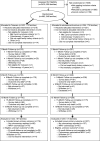Efficacy of a Telehealth Intervention on Colonoscopy Uptake When Cost Is a Barrier: The Family CARE Cluster Randomized Controlled Trial
- PMID: 26101306
- PMCID: PMC4734378
- DOI: 10.1158/1055-9965.EPI-15-0150
Efficacy of a Telehealth Intervention on Colonoscopy Uptake When Cost Is a Barrier: The Family CARE Cluster Randomized Controlled Trial
Abstract
Background: We tested the efficacy of a remote tailored intervention Tele-Cancer Risk Assessment and Evaluation (TeleCARE) compared with a mailed educational brochure for improving colonoscopy uptake among at-risk relatives of colorectal cancer patients and examined subgroup differences based on participant reported cost barriers.
Methods: Family members of colorectal cancer patients who were not up-to-date with colonoscopy were randomly assigned as family units to TeleCARE (N = 232) or an educational brochure (N = 249). At the 9-month follow-up, a cost resource letter listing resources for free or reduced-cost colonoscopy was mailed to participants who had reported cost barriers and remained nonadherent. Rates of medically verified colonoscopy at the 15-month follow-up were compared on the basis of group assignment and within group stratification by cost barriers.
Results: In intent-to-treat analysis, 42.7% of participants in TeleCARE and 24.1% of participants in the educational brochure group had a medically verified colonoscopy [OR, 2.37; 95% confidence interval (CI) 1.59-3.52]. Cost was identified as a barrier in both groups (TeleCARE = 62.5%; educational brochure = 57.0%). When cost was not a barrier, the TeleCARE group was almost four times as likely as the comparison to have a colonoscopy (OR, 3.66; 95% CI, 1.85-7.24). The intervention was efficacious among those who reported cost barriers; the TeleCARE group was nearly twice as likely to have a colonoscopy (OR, 1.99; 95% CI, 1.12-3.52).
Conclusions: TeleCARE increased colonoscopy regardless of cost barriers.
Impact: Remote interventions may bolster screening colonoscopy regardless of cost barriers and be more efficacious when cost barriers are absent.
©2015 American Association for Cancer Research.
Figures


Similar articles
-
Intervention Mediators in a Randomized Controlled Trial to Increase Colonoscopy Uptake Among Individuals at Increased Risk of Familial Colorectal Cancer.Ann Behav Med. 2017 Oct;51(5):694-706. doi: 10.1007/s12160-017-9893-1. Ann Behav Med. 2017. PMID: 28236077 Free PMC article. Clinical Trial.
-
Telehealth personalized cancer risk communication to motivate colonoscopy in relatives of patients with colorectal cancer: the family CARE Randomized controlled trial.J Clin Oncol. 2014 Mar 1;32(7):654-62. doi: 10.1200/JCO.2013.51.6765. Epub 2014 Jan 21. J Clin Oncol. 2014. PMID: 24449229 Free PMC article. Clinical Trial.
-
Cost-effectiveness of patient mailings to promote colorectal cancer screening.Med Care. 2010 Jun;48(6):553-7. doi: 10.1097/MLR.0b013e3181dbd8eb. Med Care. 2010. PMID: 20473196 Free PMC article. Clinical Trial.
-
Effectiveness of a short message service intervention to motivate people with positive results in preliminary colorectal cancer screening to undergo colonoscopy: A randomized controlled trial.Cancer. 2019 Jul 1;125(13):2252-2261. doi: 10.1002/cncr.32043. Epub 2019 Mar 2. Cancer. 2019. PMID: 30825395 Clinical Trial.
-
Effectiveness of tailored communication intervention in increasing colonoscopy screening rates amongst first-degree relatives of individuals with colorectal cancer: A systematic review and meta-analysis.Int J Nurs Stud. 2020 Jan;101:103397. doi: 10.1016/j.ijnurstu.2019.103397. Epub 2019 Aug 16. Int J Nurs Stud. 2020. PMID: 31683227
Cited by
-
Intervention Mediators in a Randomized Controlled Trial to Increase Colonoscopy Uptake Among Individuals at Increased Risk of Familial Colorectal Cancer.Ann Behav Med. 2017 Oct;51(5):694-706. doi: 10.1007/s12160-017-9893-1. Ann Behav Med. 2017. PMID: 28236077 Free PMC article. Clinical Trial.
-
Examining intrafamilial communication of colorectal cancer risk status to family members and kin responses to colonoscopy: a qualitative study.Hered Cancer Clin Pract. 2019 Jun 26;17:16. doi: 10.1186/s13053-019-0114-8. eCollection 2019. Hered Cancer Clin Pract. 2019. PMID: 31391872 Free PMC article.
-
Data-Powered Participatory Decision Making: Leveraging Systems Thinking and Simulation to Guide Selection and Implementation of Evidence-Based Colorectal Cancer Screening Interventions.Cancer J. 2018 May/Jun;24(3):136-143. doi: 10.1097/PPO.0000000000000317. Cancer J. 2018. PMID: 29794539 Free PMC article. Review.
-
The psychological challenges for oncological patients in times of COVID-19 pandemic: telemedicine, a solution?Future Oncol. 2020 Oct;16(29):2265-2268. doi: 10.2217/fon-2020-0552. Epub 2020 Jul 13. Future Oncol. 2020. PMID: 32659118 Free PMC article. No abstract available.
-
Promoting guideline-based cancer genetic risk assessment for hereditary breast and ovarian cancer in ethnically and geographically diverse cancer survivors: Rationale and design of a 3-arm randomized controlled trial.Contemp Clin Trials. 2018 Oct;73:123-135. doi: 10.1016/j.cct.2018.09.005. Epub 2018 Sep 18. Contemp Clin Trials. 2018. PMID: 30236776 Free PMC article.
References
-
- Edwards BK, Ward E, Kohler BA, Eheman C, Zauber AG, Anderson RN, et al. Annual report to the nation on the status of cancer, 1975-2006, featuring colorectal cancer trends and impact of interventions (risk factors, screening, and treatment) to reduce future rates. Cancer. 2010;116:544–73. - PMC - PubMed
-
- Levin B, Lieberman DA, McFarland B, Smith RA, Brooks D, Andrews KS, et al. Screening and surveillance for the early detection of colorectal cancer and adenomatous polyps, 2008: A joint guideline from the American Cancer Society, the US Multi-society Task Force on Colorectal Cancer, and the American College of Radiology. CA Cancer J Clin. 2008;58:130–60. - PubMed
-
- Fuchs CS, Giovannucci EL, Colditz GA, Hunter DJ, Speizer FE, Willett WC. A prospective study of family history and the risk of colorectal cancer. N Engl J Med. 1994;331:1669–74. - PubMed
-
- Screening for colorectal cancer: U.S. Preventive Services Task Force recommendation statement. Ann Intern Med. 2008;149:627–37. - PubMed
Publication types
MeSH terms
Grants and funding
LinkOut - more resources
Full Text Sources
Medical

